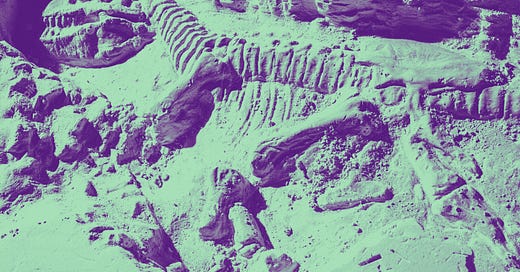When seeking to unearth a bird-like Cretaceous tyrannosauroid, you can’t tell whether you’ll stumble onto beautiful rock bones, silenced long ago in ancient alluvium, or find only the dry grist of weathered rock, piled high, nothing more than sand and grit whisked and piled thick into a matrix of mud. And yet you press on. Not in certainty, but in a species of hope, the kind of hope that science demands, that life requires, a recognition that even though it is often against the probabilities, you dig as if you might find this beast, one which might have even been covered with feathers—leaving the surrounding stone still bearing the impression of quill and rachis, embossed in shale, and preserved under pressure. So you unearth as if. Excavating, you take care, although nothing may be there, not with shovel and backhoe, but with small and agile trowels handled with grace, encouraged by brushes, removing the frozen bone with attention and stealth—you honor its fragility and vulnerability. Not in pretense or inauthentic performance, but in hope, striving towards recognition that what we uncover may be vital abundance. And though you may find not even the fragment of a toe, you work as if you will find treasure, as if every move you make might break apart the paleontological plum over which every dinosaur-hunter lusts, as if this is the place that will be remembered for a hundred years. It is how you honor the probability that something may be there: You dig as if it were more certain than it ever can be.
Steven L. Peck is an Associate Professor of Biology at BYU and the author of A Short Stay in Hell and Heike’s Void.
Artwork by Zachary Davis.






